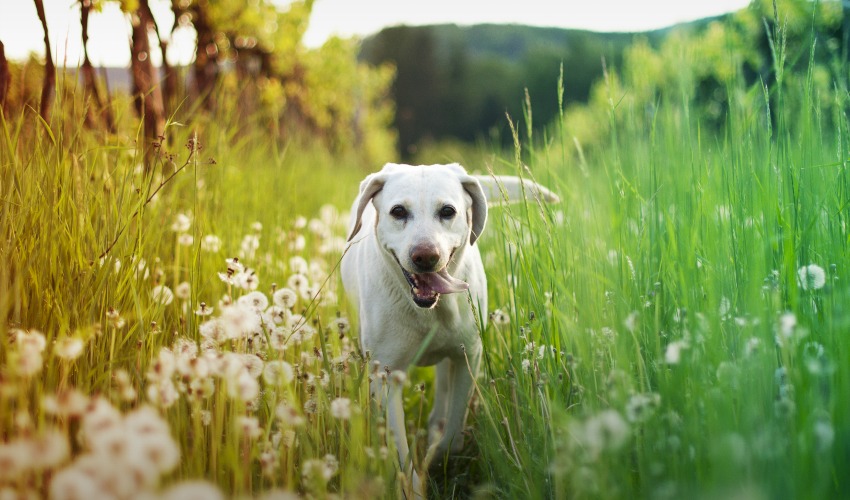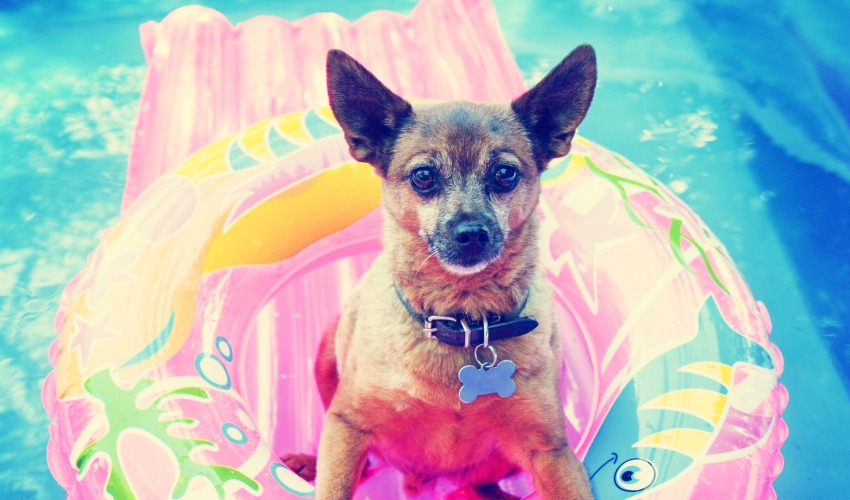For those of us in the northern hemisphere, summer is almost here! High temperatures and lots of sun are major perks for dog owners who are tired of trudging through blizzards and de-icing their dogs on their daily walks.
But between days at the beach, lots of sun exposure, and bug bites, summer can also introduce some safety concerns for dogs of all ages. Make your salon a safe space for dogs of all kinds—beach bums, adventurers, and couch potatoes included!—with these 7 summer safety tips.
1. Keep It Cool
In many places, summer can mean soaring temperatures that are uncomfortable for people and dogs alike. With dryers, clippers, and other machinery running all day long, your salon is likely to heat up—so make sure you can keep your doggy clients cool.
Grooming can be a stressful experience for many dogs, making them more likely to overheat and less likely to drink water. Heat exhaustion, heat stroke, and dehydration are all major dangers in the salon, and summer temperatures can make their risks skyrocket.
Avoid any incidents by ensuring your salon has sufficient air conditioning to keep dogs nice and cool during the groom. Keep lots of water on hand, in addition to dehydration aids such as Gatorade or Pedialyte. And during summer months, be especially vigilant about monitoring incoming dogs for signs of heat exhaustion or dehydration. If a puppy enters your salon looking lethargic after a day at the beach, it may be a good idea to send him home to recover and reschedule the appointment.

2. Watch Out for Bug Bites
Dogs are susceptible to bug bites year round, but warm, buggy areas and increased outdoor time makes the summer especially bad.
- Bee and wasp stings
- Mosquito bites
- Flea bites
- Tick bites
In many cases these stings and bites are just harmless irritations. As a groomer, all you’ll have to do is make sure you avoid nicking any bumps with your clippers or scissors. But watch out, because mosquitos and ticks can also transmit harmful diseases to dogs.
If you find any bug bites let the dog’s owner know, just to be on the safe side. Keep your tick twisters handy in case of dogs that have picked up a hitchhiker or two. After removing a tick, you can put it in a sealed plastic bag or capsule so your client can take it to the vet for testing if necessary.
Before summer starts, advise your clients to seek preventative tick, flea, and mosquito treatment from their vets. Flea prevention treatments, heartworm pills, and other measures significantly decrease a dog’s risk of experiencing serious bug-related complications.
3. Encourage Sun Safety
Your client’s dog will be ecstatic about his week-long beach vacation—until he ends up with an itchy, painful sunburn after the first two days! Just like with people, too much direct sun exposure isn’t good for dogs.
Dogs with thick, full coats already have built-in sun protection, but hairless dogs, smooth-coated dogs, and dogs with bald patches need a little extra help. Canine sunscreen provides nontoxic sun protection to reduce the risk of burns. When applying sunscreen, clients need to remember noses, ears, and other unprotected areas.
Touch base with your clients to see what their plans are for the summer so you can recommend sunscreen if necessary. Just be sure they know to look for sunscreen formulated specifically for dogs, as human sunscreen can be harmful. Light-colored doggy t-shirts are another sun protection option.
Dog owners can also invest in specially designed doggy hats and sunglasses. These protect a dog’s eyes from the sun glare off large bodies of water—and they keep your client’s pup looking cool!

4. No Shave-Downs, Please
Smooth- and short-coated dogs are at an increased risk of bug bites and sunburn, but dogs with thick, heavy coats have their own problems—over-zealous owners! Well-intentioned owners may ask you to shave down thick coats to keep their dogs “cool” over the summer. What they don’t know is that these thick coats actually help their dogs regulate temperature. Plus, many dogs live in comfortably air-conditioned homes. Their coats help them stay comfortable inside and out.
Unless a thick-coated dog has a health issue requiring a full shave-down, you should never allow your client to go ahead with this service. Instead, educate your client about the purpose of her dog’s thick coat and propose some alternative solutions. Her Husky doesn’t need a shave-down—but he’d definitely appreciate a kiddy pool full of ice cubes and cold water for splashing around!
5. Summer Style
A total shave-down is out of the question, but for many dogs a summer cut is a good option. Summer cuts are shorter and often less elaborate than regular cuts. These cuts are perfect for dogs who will be spending a lot of time in the water, whether it’s at a lake or a backyard pool.
If you’ve ever missed a mat before bathing a dog, you’ll know that water just tightens up tangles. Chlorine-treated pools are especially damaging to a dog’s coat, which can increase the likelihood of mats even further. Plus, many dogs spend their summers hiking or playing in the yard with their owners, where they can pick up mud, burrs, twigs, and other materials that will cause coats to tangle and mat.
On a groomed breed, a short coat is easy for outdoorsy owners to maintain over the summer. Your client may not love the length as much as her regular cut, but if she agrees to a short summer cut she cuts down on the risk of a totally pelted dog. Remember, hair will always grow back!

6. Have the “Swimming Safety” Talk
Swimming safety is your client’s responsibility, but you should always be prepared to help out by answering questions and providing information. Dogs are natural swimmers—meaning if you put them in water, they’ll instinctively start that unique “doggy paddle.” However, instinct doesn’t always translate to ability.
Even strong swimmers should always be supervised in the pool, and clients should train their dogs to stay within reach. Dog-sized lifejackets are also available as an extra safety measure. These are essential for dogs who love the water but don’t have the strength or ability to swim very well. If your grooming salon stocks inventory for sale, you can even consider adding doggy lifejackets to provide easy access to your clients.
Different swimming situations have different risks. River, lakes, and oceans can have strong currents, waves, and undertows that may overpower even the strongest swimmers. On the other hand, if a dog falls into a covered pool, he can become trapped in the plastic cover. And even a little kiddy pool can pose a risk to a brachycephalic dog if he starts snorting in water. Supervision and good training are essential for splashing around safely.

7. Prepare Your Clients!
Air conditioned salons, attention to bug bites, and appropriate summer cuts are all your responsibilities as a groomer. Beyond that, summer safety is in your client’s hands.
You don’t want to patronize knowledgeable clients, nor do you have the time to lecture every incoming client on the details of summer safety. Instead, consider putting together a page full of summer safety tips to offer to your clients. On your sheet, explain summer safety risks for dogs and how your clients can avoid them. This way your client will have these essential pointers right at hand all summer long!
Want to practice your summer grooming skills all year? Consider becoming a dog groomer in California!







